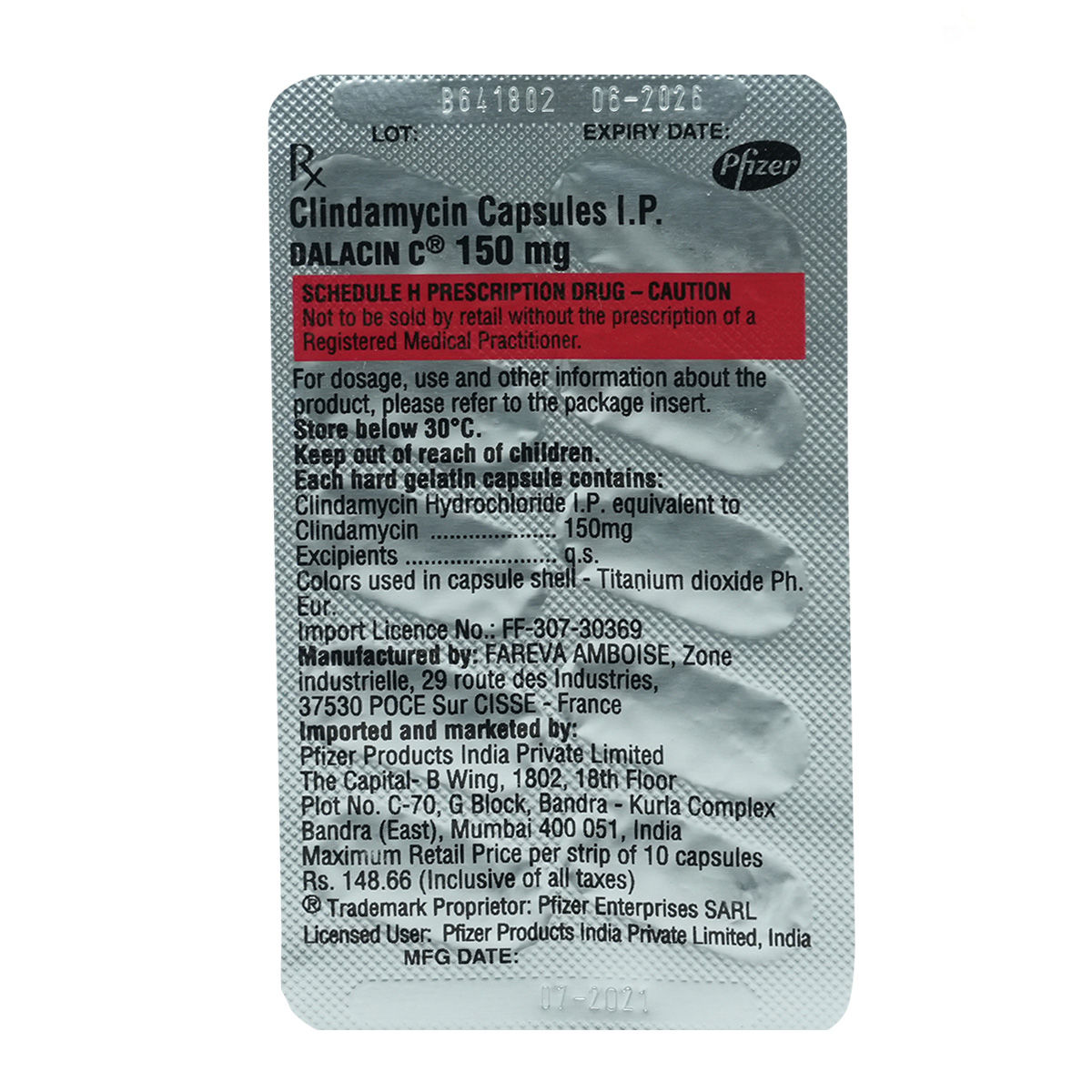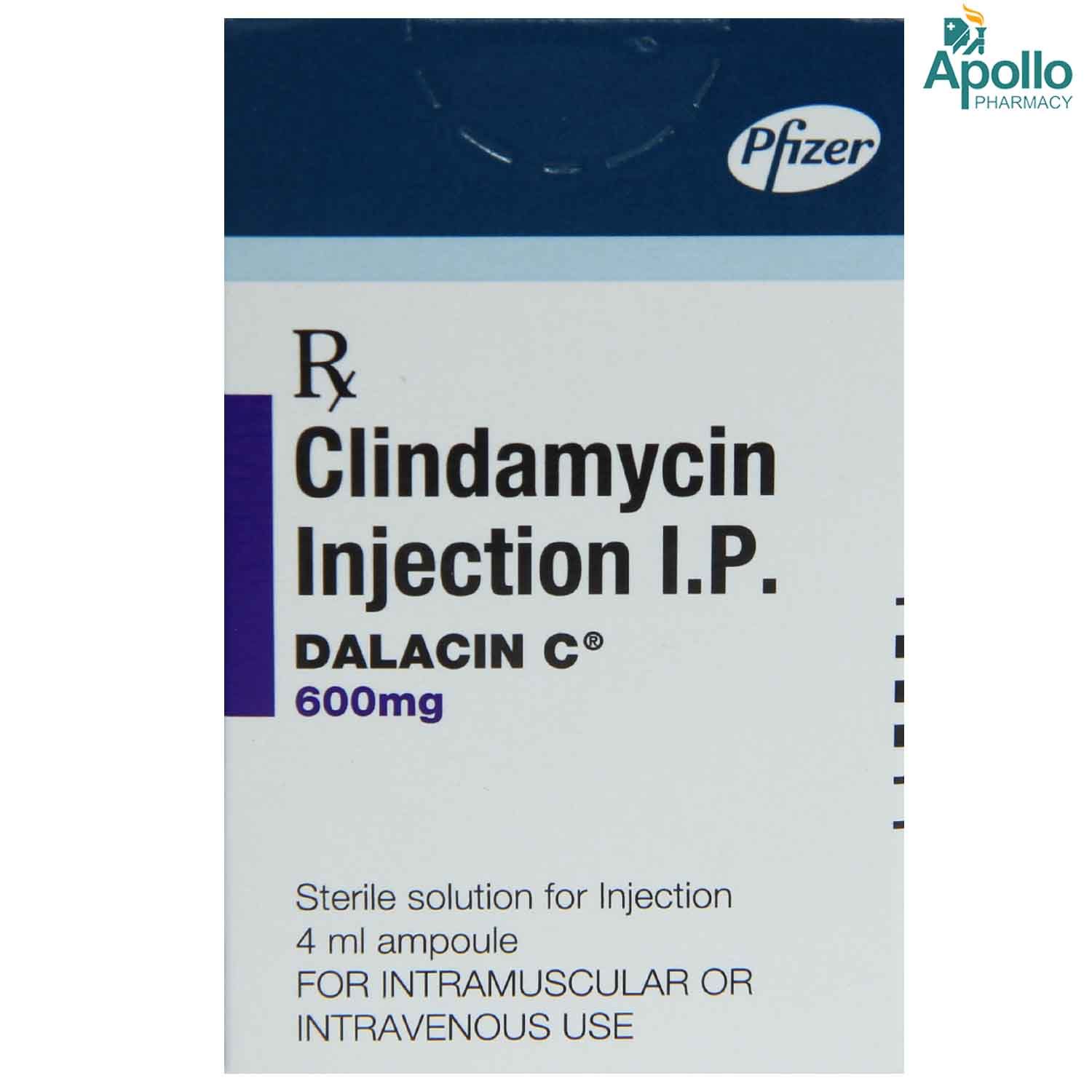Clintoss 150mg Tablet

₹144*
MRP ₹160
10% off
₹136*
MRP ₹160
15% CB
₹24 cashback(15%)
Free Delivery
With Circle membership
(Inclusive of all Taxes)
This offer price is valid on orders above ₹800. Apply coupon PHARMA10/PHARMA18 (excluding restricted items)
Know Your Delivery Time
Provide Delivery Location
Available Offers
 Prescription drug
Prescription drugWhats That

Secure Payment

India's Most Trusted Pharmacy

Genuine Products
About Clintoss 150mg Tablet
Clintoss 150mg Tablet is used to treat bacterial infections. Bacterial infection occurs when harmful bacteria grow in the body and cause illness. It can infect any part of the body and multiply very quickly. Clintoss 150mg Tablet will not work for viral infections, such as the common cold and flu.
Clintoss 150mg Tablet contains 'Clindamycin' that works by preventing bacterial protein synthesis, leading to the inhibition of bacterial growth. It shows a bacteriostatic effect that stops bacterial reproduction. Clintoss 150mg Tablet effectively treats infections caused by gram-positive and anaerobic (living without air) bacteria, including susceptible strains of Staphylococcus aureus, Streptococcus pneumoniae, and Clostridium perfringens.
Take Clintoss 150mg Tablet as advised by a doctor. Clintoss 150mg Tablet may cause side effects, although not everybody gets them. Common side effects of Clintoss 150mg Tablet include stomach pain, nausea, vomiting, diarrhoea, heartburn, skin rash, and vaginal itching or discharge. Most of these side effects do not require medical attention and gradually resolve over time. If these side effects persist longer, please consult your doctor.
Inform the doctor if you are allergic to any of the components in Clintoss 150mg Tablet. Let your doctor know if you have any liver disease, kidney disease, gastrointestinal diseases (colitis, an inflammation of the colon), yellow food dye allergy, or allergic conditions (asthma, hay fever, eczema). Do not use Clintoss 150mg Tablet while getting vaccinated with live bacterial vaccines (typhoid vaccine) since Clintoss 150mg Tablet may affect vaccine activity. Clintoss 150mg Tablet should be used only with a doctor's advice during pregnancy and breastfeeding.
Uses of Clintoss 150mg Tablet
Directions for Use
Medicinal Benefits
Clintoss 150mg Tablet is an antibiotic that treats bacterial infections. It works by inhibiting bacterial protein synthesis, which inhibits bacterial growth. It shows a bacteriostatic effect, which stops bacterial reproduction but doesn't kill them. Clintoss 150mg Tablet effectively treats infections caused by gram-positive and anaerobic (living without air) bacteria, including susceptible strains of Staphylococcus aureus, Streptococcus pneumoniae, and Clostridium perfringens.
How Clintoss 150mg Tablet Works
Storage
Side Effects of Clintoss 150mg Tablet
Stomach pain
Nausea
Vomiting
Diarrhoea
Heartburn
Skin rash
Vaginal itching or discharge
What if I have taken an overdose of Clintoss 150mg Tablet
Drug Warnings
Do not use Clintoss 150mg Tablet if you are allergic to any of its components. Let your doctor know if you have any liver or kidney diseases, gastrointestinal diseases (colitis, Clostridium difficile-associated diarrhoea), yellow food dye allergy, and allergic conditions (asthma, hay fever, eczema). Do not use Clintoss 150mg Tablet while getting vaccinated with live bacterial vaccines (typhoid vaccine) since Clintoss 150mg Tablet may affect vaccine activity. Pregnant and breastfeeding women should consult their doctor before taking Clintoss 150mg Tablet. Clintoss 150mg Tablet should be used in children only when prescribed by a doctor.
Drug-Drug Interactions
Drug-Drug Interactions
Login/Sign Up
Taking Clintoss 150mg Tablet with clarithromycin may increase the effects of Clintoss 150mg Tablet.
How to manage the interaction:
Although there is a possible interaction, Clintoss 150mg Tablet can be taken with clarithromycin if prescribed by the doctor. Consult the prescriber if you experience persistent vomiting, nausea, abdominal pain, or diarrhea. Do not discontinue the medication without consulting a doctor.
Co-administration of Boceprevir together with Clintoss 150mg Tablet can increase the effects of Clintoss 150mg Tablet.
How to manage the interaction:
Although there is a possible interaction between Clintoss 150mg Tablet and Boceprevir, you can take these medicines together if prescribed by your doctor. If you have ongoing feelings of sickness, throwing up, having loose stools, or pain in your stomach, it's important to contact your doctor right away. Do not stop using any medications without a doctor's advice.
Concomitant use of Clintoss 150mg Tablet with indinavir may increase the effects of Clintoss 150mg Tablet.
How to manage the interaction:
Although there is a possible interaction, Clintoss 150mg Tablet can be taken with indinavir if prescribed by the doctor. Consult the prescriber if you experience persistent vomiting, nausea, abdominal pain, or diarrhoea.
When taken in combination, Clintoss 150mg Tablet can lower the amount or action of estradiol.
How to manage the interaction:
Co-administration of Estradiol with Clintoss 150mg Tablet can result in an interaction, but it can be taken if a doctor has advised it. Do not stop using any medications without a doctor's advice.
Taking Clintoss 150mg Tablet with Botulinum toxin can increase the risk or severity of side effects.
How to manage the interaction:
Taking Clintoss 150mg Tablet with Botulinum toxin together can result in an interaction, they can be taken together if prescribed by a doctor. However, if you experience any unusual symptoms contact a doctor immediately. Do not discontinue any medications without consulting a doctor.
Concomitant use of Clintoss 150mg Tablet with ceritinib can increase the effects of Clintoss 150mg Tablet
How to manage the interaction:
Although there is a possible interaction, Clintoss 150mg Tablet can be taken with ceritinib if prescribed by the doctor. Consult the prescriber if you experience persistent vomiting, nausea, abdominal pain, or diarrhoea.
Co-administration of Clintoss 150mg Tablet with Balsalazide may reduce the effectiveness of Balsalazide.
How to manage the interaction:
Although there is a possible interaction, Clintoss 150mg Tablet can be taken with balsalazide if prescribed by the doctor. Consult the prescriber if you have any concerns, the doctor may prescribe alternatives that do not interact, dose adjustment, or more frequent monitoring to safely use both medications. Do not discontinue the medication without consulting a doctor.
Co-administration of Clintoss 150mg Tablet with Atracurium can increase the risk of muscle weakness.
How to manage the interaction:
Taking Clintoss 150mg Tablet with Atracurium together can possibly result in an interaction, but it can be taken if a doctor has advised it. "Clintoss 150mg Tablet can affect the muscles and nerves in your body. When used with other medications that also affect the muscles and nerves, it can cause a serious problem called neuromuscular blockade. If you have trouble breathing or can't breathe at all, please call your doctor right away." Do not stop using any medications without a doctor's advice.
Co-administration of of Clintoss 150mg Tablet with gentamicin may increase the risk of kidney and/or nerve damage.
How to manage the interaction:
Although there is a possible interaction, Clintoss 150mg Tablet can be taken with gentamicin if prescribed by the doctor. Consult the prescriber if you experience signs and symptoms of kidney damage such as sudden weight gain or weight loss, nausea, vomiting, fluid retention, loss of appetite, increased or decreased urination, swelling, shortness of breath, muscle cramps, tiredness, weakness, dizziness, confusion, and irregular heart rhythm. If you develop diarrhea or vomiting during treatment with these medications, drink plenty of fluids to prevent dehydration, as dehydration may also harm the kidney.
Concomitant use of Clintoss 150mg Tablet with itraconazole can reduce the metabolism and increase the levels of Clintoss 150mg Tablet in the body. This may increase the risk or severity of side effects.
How to manage the interaction:
Although there is a possible interaction, Clintoss 150mg Tablet can be taken with itraconazole if prescribed by the doctor. Consult a doctor immediately if you experience persistent vomiting, nausea, abdominal pain, or diarrhea. Do not stop using any medications without first talking to your doctor.
Drug-Food Interactions
Drug-Food Interactions
Login/Sign Up
Diet & Lifestyle Advise
Include whole-grain foods like multigrain bread and brown rice in your diet.
Taking probiotics after an antibiotic treatment reduces the risk of antibiotic-associated diarrhoea.
Try taking yoghurt, cheese, sauerkraut, and kimchi that help restore the intestine's good bacteria.
Include more fibre-enriched food in your diet that is easily digested by your gut bacteria. Fibre foods may also help restore healthy gut bacteria after a course of antibiotics.
Avoid intake of alcoholic beverages as it can make you dehydrated and affect your sleep.
Manage stress, eat healthily, drink plenty of water, exercise regularly, and get plenty of sleep.
Habit Forming
Therapeutic Class
Clintoss 150mg Tablet Substitute

Dalacin C 150 Capsule 10's
by Others
₹15.09per tabletDalacin C 600 mg Injection 4 ml
by Others
₹55.88per tabletCamyda 150 mg Capsule 8's
by Others
₹13.50per tabletCapiclin-150 Capsule 10's
by Others
₹18.00per tabletBraclin 150mg Capsule
by Others
₹1.49per tablet
Product Substitutes
Alcohol
Caution
Avoid taking alcohol while using Clintoss 150mg Tablet since it may worsen the side effects.
Pregnancy
Caution
Please consult your doctor before taking Clintoss 150mg Tablet if you are pregnant or planning to conceive.
Breast Feeding
Caution
Clintoss 150mg Tablet is not recommended during breastfeeding since it can be excreted into breast milk. Please consult your doctor before taking Clintoss 150mg Tablet if you are breastfeeding.
Driving
Safe if prescribed
Clintoss 150mg Tablet usually does not interfere with your driving ability.
Liver
Caution
Let your doctor know if you have any history of liver diseases before taking Clintoss 150mg Tablet since it may cause jaundice and abnormal liver function tests.
Kidney
Caution
Let your doctor know if you have any history of kidney diseases before taking Clintoss 150mg Tablet.
Children
Caution
Clintoss 150mg Tablet should be used in children only when prescribed by a doctor. Your doctor will prescribe the dose depending on the child's age and body weight.
FAQs
Clintoss 150mg Tablet is used to treat bacterial infections.
Clintoss 150mg Tablet is an antibiotic that treats bacterial infections. It works by inhibiting bacterial protein synthesis, which retards bacterial growth.
Clintoss 150mg Tablet should be used with proper caution and doctor consultation if you have any liver disease, kidney disease, gastrointestinal diseases (colitis, an inflammation of the colon), yellow food dye allergy, and allergic conditions (asthma, hay fever, eczema).
Clintoss 150mg Tablet can affect the live vaccines like typhoid vaccine and decrease its effectiveness. Please consult a doctor before you start Clintoss 150mg Tablet if you are due to undergo any vaccinations.
Clintoss 150mg Tablet may cause abnormal liver function tests as one of its side effects. Please consult your doctor before starting Clintoss 150mg Tablet if you have any history of liver problems.
Disclaimer
Author Details
We provide you with authentic, trustworthy and relevant information

















